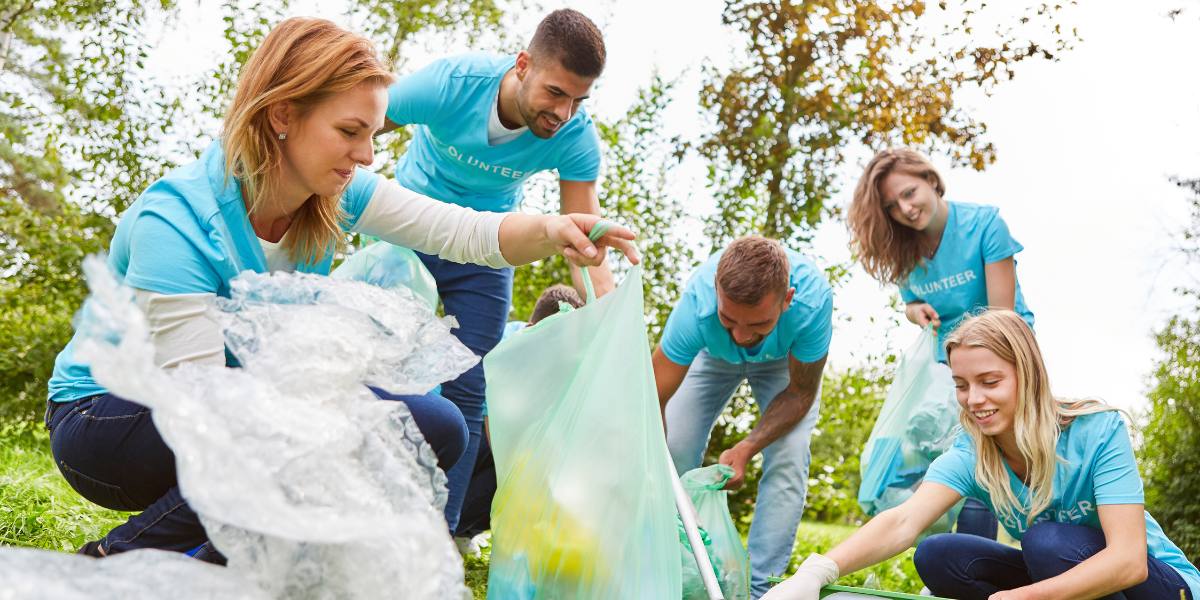Managing waste in a community goes beyond simply disposing of trash. It requires a proactive approach that engages residents, local businesses, and authorities to work together toward a common goal: creating a cleaner, healthier, and more sustainable environment.
Waste management impacts not only the cleanliness of our surroundings but also public health, wildlife, and the broader ecosystem.
Here’s a more detailed guide on how to manage waste in your community effectively and build a foundation for lasting environmental stewardship.
Encourage Waste Segregation at the Source
Proper waste management starts with each household and business taking responsibility for separating their waste.
When waste is sorted at the source, it becomes easier to recycle, compost, and safely dispose of hazardous materials. Key
categories include:
Organic Waste: Kitchen scraps, garden clippings, and other biodegradable materials can be composted. Encouraging households to
separate food scraps from their regular waste can significantly reduce landfill usage.
Recyclable Waste: Materials such as plastics, glass, metals, and paper should be separated and cleaned before being placed in
recycling bins.
Many communities struggle with contamination in recycling programs—educating residents on cleaning recyclables
(e.g., rinsing food containers) can improve recycling success rates.
Hazardous Waste: Items like chemicals, batteries, electronic waste (e-waste), and medical supplies pose serious risks if not handled properly. Designated bins or drop-off locations for hazardous waste can prevent harmful materials from entering regular trash streams.
General Waste: Items that cannot be recycled or composted, such as certain plastics or packaging materials, should be placed in designated general waste bins.
To promote this, communities can provide color-coded bins, easy-to-understand guidelines, and regular reminders. Public awareness campaigns focusing on the long-term benefits of segregation.
Such as reduced landfill use, lower waste management costs, and environmental protection—can motivate residents to participate.
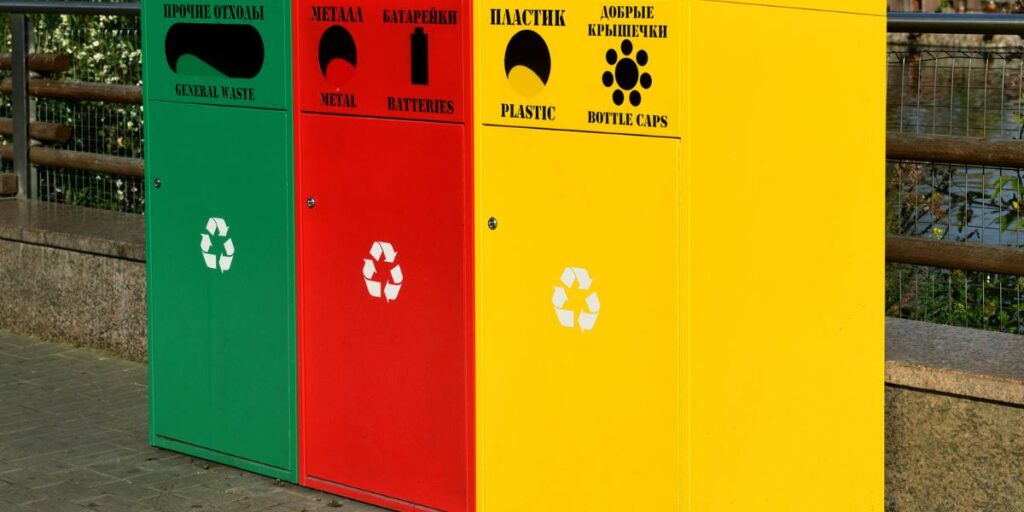
Develop Robust Recycling Programs
A well-organized recycling program can drastically reduce the volume of waste sent to landfills. Here’s how you can elevate your community’s recycling efforts:
Curbside Pickup Services: Establish or enhance curbside recycling programs where residents place recyclables in separate bins for regular collection. Simplifying the process encourages more people to recycle consistently.
Convenient Drop-Off Locations: For items that cannot be collected curbside, such as large electronics, set up accessible drop-off centers at local community hubs. Ensure the locations are well-advertised, and consider hosting special collection days for electronics or bulk recyclables.
Incentivize Participation: Consider providing incentives, such as tax breaks or rewards for households and businesses that consistently recycle or significantly reduce their waste output.
Educate on Contamination: Recycling contamination happens when non-recyclable items or dirty recyclables are mixed into the recycling stream, making it harder to process. Educational workshops, brochures, and online tutorials can help residents understand what is and isn’t recyclable.
By integrating a strong, clear recycling infrastructure, communities can minimize waste, save energy, and create a circular economy where materials are reused instead of discarded.
Communities should also consider renting dumpsters for large recycling events. For those in Hurst, this can streamline the recycling process and encourage participation.

Maximize Organic Waste Management Through Composting
Food waste and organic materials make up a significant portion of total community waste. Instead of sending this organic matter to landfills where it emits methane—a potent greenhouse gas—composting allows communities to create valuable soil enhancers.
Here’s how to optimize organic waste management:
Create Community Composting Sites: Designated areas where residents can drop off their organic waste, such as vegetable peels, coffee grounds, and garden trimmings. These sites should be managed by the community or municipal staff and provide compost to local parks, gardens, or residents.
Offer At-Home Composting Solutions: Provide composting bins for individual households and teach residents how to compost at home. Offer incentives such as discounts on compost bins, free starter kits, or composting workshops.
Launch Green Waste Pickup Programs: In areas where space is limited, organize a curbside pickup system for organic waste. This service can be seasonal (for garden waste) or year-round for food scraps.
Composting not only reduces waste but also enriches soil, reducing the need for chemical fertilizers and enhancing local agriculture or gardening efforts.
To effectively manage large quantities, consider renting a dumpster for organic waste collection, especially in Saginaw where community gardens thrive.
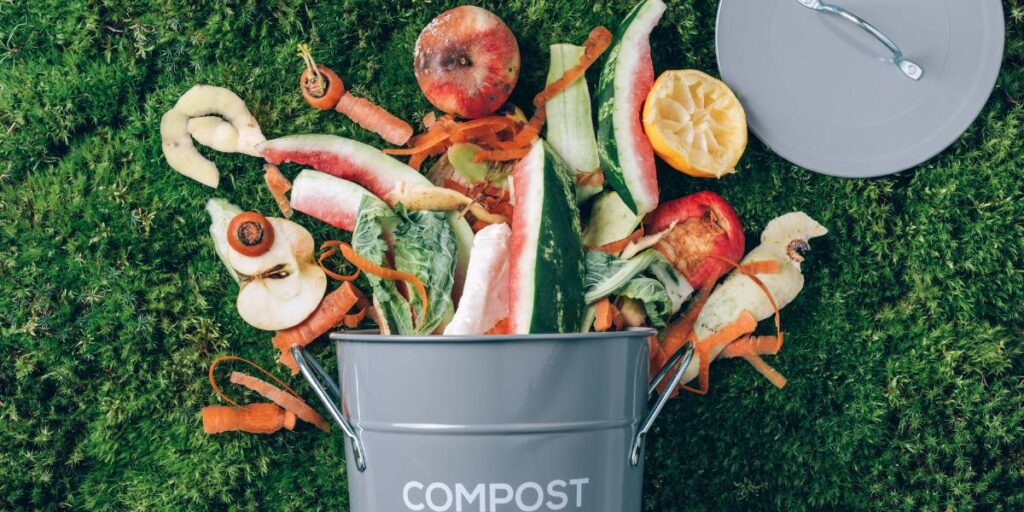
Promote the ‘Reduce, Reuse, Repurpose’ Philosophy
Waste management isn’t just about disposal; it’s about minimizing waste in the first place. By reducing consumption, reusing what we can, and creatively repurposing items, we can shrink the amount of waste generated.
Here’s how your community can embrace this philosophy:
Encourage Minimalism and Conscious Consumerism: Host educational workshops or social media campaigns focused on reducing unnecessary purchases, choosing durable goods over disposables, and supporting local, sustainable brands.
Organize Community Swap Meets: Encourage residents to exchange gently used items they no longer need—clothing, books, toys, and household goods. This not only keeps items out of the trash but also builds a sense of community.
Thrift Stores and Donation Drives: Partner with local charities or establish donation centers where residents can drop off reusable items like furniture, appliances, or clothing. Ensure that these items are redirected to people in need or sold through local thrift stores.
Upcycling and DIY Workshops: Host creative workshops where residents can learn to transform old items into new, functional products—such as turning mason jars into planters, or worn-out jeans into tote bags. These events can inspire creativity while reducing waste.
Reducing and reusing can significantly lower the overall waste burden while fostering a mindset of sustainability within the community.
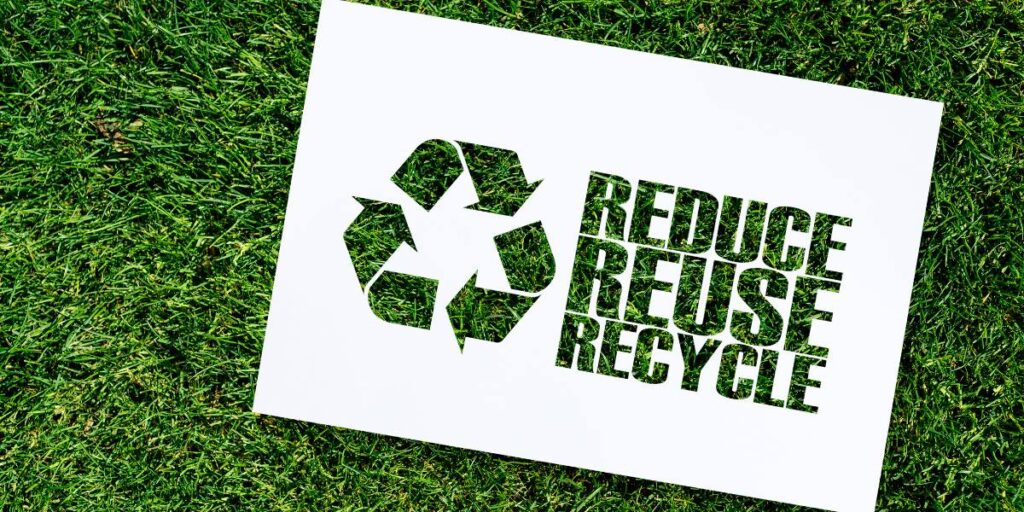
Proper Handling of Hazardous Waste
Hazardous waste, including chemicals, batteries, e-waste, and medical supplies, requires special attention due to its potential to harm both humans and the environment.
Here’s how to handle hazardous waste effectively:
Host Hazardous Waste Collection Days: Regularly scheduled events where residents can safely dispose of items like paint, motor oil, fluorescent bulbs, and expired medications. Ensure that collection sites are convenient, and promote them widely so that no hazardous waste is disposed of improperly.
Establish Permanent Drop-Off Locations: For ongoing convenience, create designated hazardous waste drop-off points that are
accessible year-round. Ensure that staff or volunteers at these locations are trained in handling these materials.
Partner with Specialized Waste Companies: Work with licensed hazardous waste management companies to handle disposal and
recycling. These companies have the expertise to safely process items such as electronic waste, which contains valuable materials like precious metals.
Proper hazardous waste disposal not only protects the environment but also prevents harmful chemicals from contaminating water sources, soil, and air.
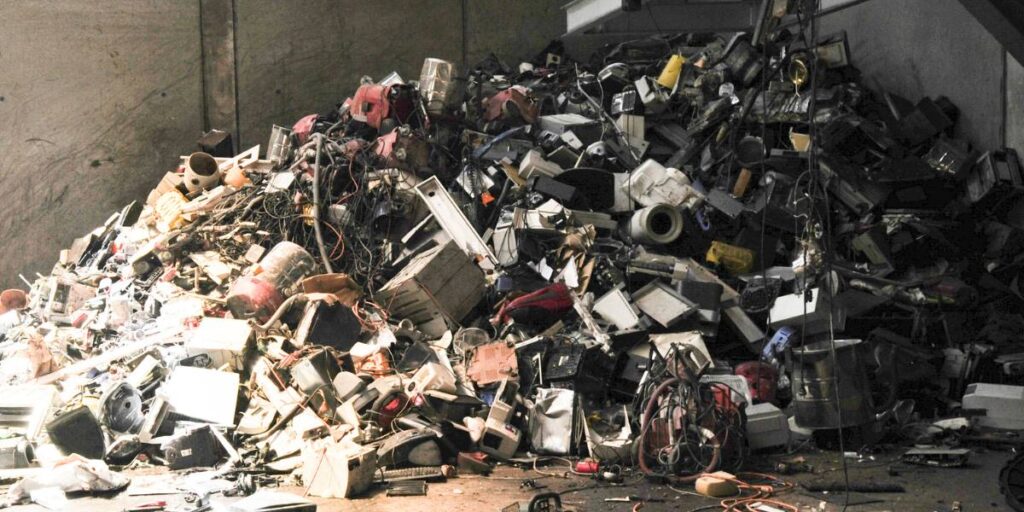
Engage the Community with Clean-Up Drives
Community clean-up drives are an impactful way to bring people together while making a visible difference in public spaces.
Here’s how to make your clean-up events effective and engaging:
Focus on Litter Hotspots: Identify areas most in need of cleaning, such as parks, beaches, streets, or riversides. You can also ask local businesses to sponsor clean-up efforts or provide materials like gloves, bags, and refreshments for volunteers.
Turn It into a Social Event: Make clean-up events fun and social by adding music, contests, or community meals afterward. Recognize top participants or the most creative clean-up stories to keep people motivated.
Create Partnerships: Collaborate with local schools, environmental groups, and businesses to broaden participation. Clean-up events can double as educational opportunities, teaching volunteers about the impact of waste and the importance of maintaining a clean environment.
Regular clean-up drives not only improve the appearance of public spaces but also foster a strong sense of responsibility and pride among residents.
For efficient waste collection during these events, communities can rent dumpsters, such as those available in North Richland Hills.
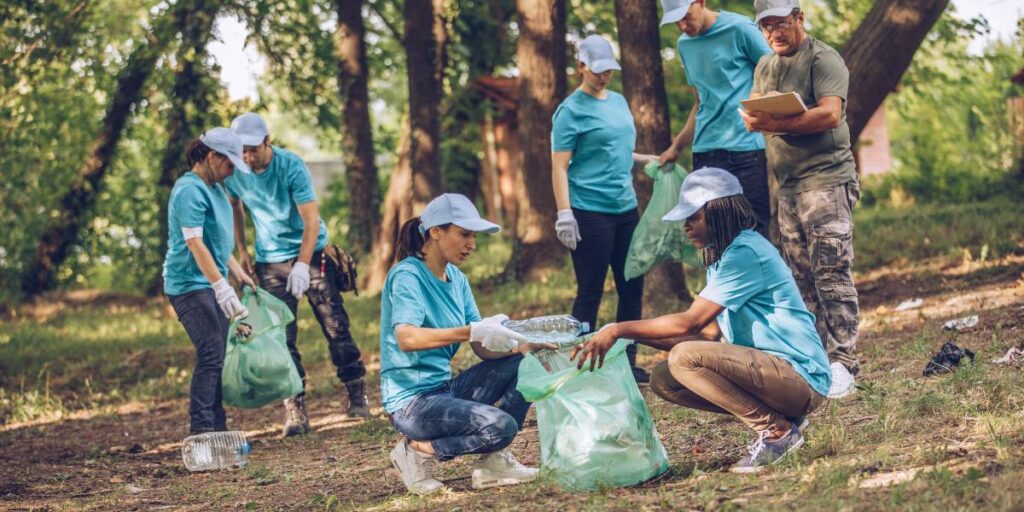
Shift to Eco-Friendly, Sustainable Products
The transition to eco-friendly products is an essential aspect of waste reduction. Communities can encourage sustainable consumption by:
Offering Reusable Alternatives: Promote the use of reusable bags, bottles, and containers in place of single-use plastics. Provide affordable or free reusable items to residents during local events or clean-up drives.
Supporting Local Businesses: Encourage businesses to switch to biodegradable or compostable packaging and products. Communities can even create eco-friendly business certifications to recognize companies making a positive environmental impact.
Educating on the Benefits of Green Products: Launch educational campaigns that inform residents about the environmental and health benefits of using sustainable products, including fewer toxins, reduced waste, and energy conservation.
Making the switch to eco-friendly products can significantly reduce the amount of waste generated and foster a culture of sustainability throughout the community.

Improve Waste Collection and Disposal Services
Having efficient waste collection services in place ensures that the community remains clean and hygienic. Communities should focus on:
Smart Waste Management: Invest in technology like smart bins, which notify collection services when they’re full, ensuring timely pickups and preventing overflowing bins.
Regular Maintenance of Waste Systems: Ensure that all trash, recycling, and composting systems are regularly maintained and collected. Delays in collection can result in illegal dumping or hazardous conditions in public spaces.
Responsible Landfill Management: Where necessary, ensure that landfills are managed properly to minimize environmental impact, including measures to capture methane emissions and prevent groundwater contamination.
A smooth-running waste collection and disposal system ensures that the community remains clean, safe, and well-managed.
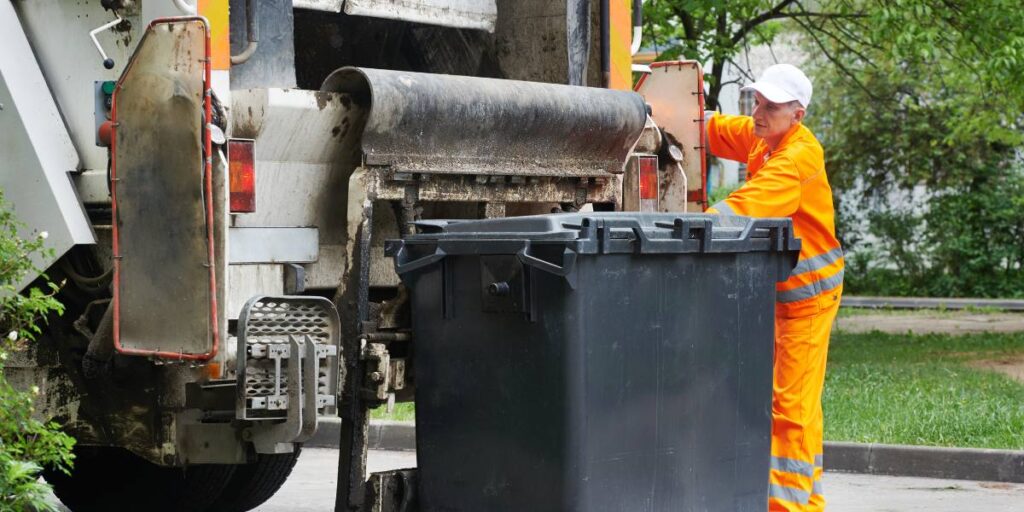
Ongoing Education and Advocacy
The key to long-term waste management success is continuous education and advocacy. It’s important to keep residents engaged and informed about waste reduction practices:
Workshops and Community Events: Regularly host workshops and seminars on topics like recycling, composting, and upcycling. Offer hands-on learning experiences to make these events interactive and fun.
Digital Outreach: Leverage social media and community websites to share tips, updates, and educational content on waste management. Celebrate community success stories and highlight individual contributions to foster a culture of environmental awareness.
School Programs: Teaching the next generation about sustainability is vital. Incorporate waste management education into school
curriculums and organize student-led clean-up or recycling programs to engage young people early.

FAQs About How to Manage Waste in Your Community
Why is proper waste management important for a community?
Proper waste management reduces environmental pollution, prevents public health hazards, and promotes a cleaner, more sustainable living space. It also helps conserve resources by encouraging recycling and reducing the strain on landfills.
What types of waste should I separate at home?
At home, you should separate your waste into four main categories: organic waste (compostable items like food scraps), recyclables
(plastics, glass, paper, metals), hazardous waste (batteries, chemicals, electronic waste), and general waste (non-recyclable items
like certain plastics).
How can recycling benefit the community?
Recycling is a simple way to save natural resources, cut down on greenhouse gas emissions, and keep more waste out of landfills.
It also supports the creation of new products from recycled materials, promoting a circular economy and reducing the need for virgin
resources.
What should I do with hazardous waste like batteries or chemicals?
Never toss hazardous waste in with your regular trash. Instead, participate in community hazardous waste collection events or take these items to designated drop-off centers for proper disposal or recycling.
Can composting really make a difference in waste management?
Yes! Composting significantly reduces the amount of organic waste sent to landfills, where it would produce harmful methane gas. Composting also provides nutrient-rich soil that can be used in gardens and community green spaces.
How can I encourage my neighbors to participate in waste management efforts?
Start by sharing information about the benefits of proper waste management, and organize community clean-up events, recycling programs, or composting workshops. Lead by example and show others how easy and impactful it can be to make small changes.
What are some simple steps I can take to reduce waste?
You can reduce waste by adopting habits like using reusable bags and containers, choosing products with minimal packaging, buying in bulk, donating items instead of discarding them, and composting organic waste.
Conclusion
Managing waste in a community is more than just a responsibility—it’s an opportunity to make a lasting positive impact on the environment and the health of future generations.
By adopting strategies like waste segregation, recycling, composting, reducing hazardous waste, and engaging in community clean-up efforts, we can all contribute to a cleaner, greener world.
Waste management requires the collective efforts of individuals, businesses, and local authorities, but with commitment and ongoing education, it’s possible to foster a sustainable community where everyone benefits.
The journey toward efficient waste management starts with small, everyday actions. Whether it’s reducing single-use plastics, participating in recycling programs, or encouraging others to join the cause, each contribution matters.
When communities work together, they build more than just a cleaner neighborhood—they create a legacy of environmental
stewardship and shared responsibility that will benefit generations to come. The time to act is now. Let’s reduce waste, protect our planet, and build a cleaner future for everyone!
